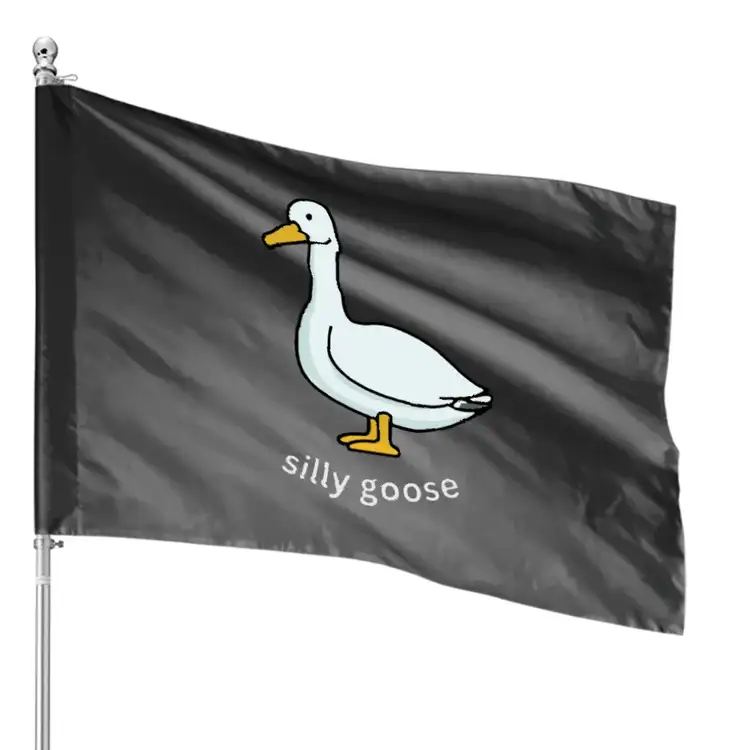No products in the cart.
News
Unlocking the Mystery: What Does Silly Goose Mean?
In the colorful tapestry of idiomatic expressions, “silly goose” stands out as a delightful phrase that often elicits a chuckle or a smile. But what exactly does it mean? What Does Silly Goose Mean? Join LefrockOnline Store on a linguistic journey as we unravel the whimsical meaning behind this charming term.
Understanding the Quirkiness:
Delving deeper into the essence of “silly goose,” we uncover its rich tapestry of meaning and its significance within the realm of language. At first glance, the term appears straightforward, evoking images of playful waterfowl waddling about with an air of whimsy. However, beneath its surface simplicity lies a nuanced expression that encapsulates the intricacies of human interaction.

When we affectionately label someone as a “silly goose,” we are not merely commenting on their outward behavior but acknowledging a deeper aspect of their character. It is a term of endearment, a gentle nudge to remind them of their playful nature or to affectionately tease them for their momentary lapse into silliness. In this sense, the term serves as a bridge between camaraderie and affection, allowing for lighthearted banter and shared laughter.
Moreover, the figurative usage of “silly goose” extends beyond individual interactions to encompass broader cultural contexts. It reflects our collective fascination with language’s ability to convey meaning beyond the literal, weaving a tapestry of idioms and expressions that enrich our communication. In this way, “silly goose” becomes more than just a phrase; it becomes a symbol of the playful spirit that infuses our daily interactions.
Furthermore, the quirkiness of “silly goose” lies in its ability to transcend generations and cultures, uniting people across linguistic boundaries with its universal appeal. Whether uttered in jest or with genuine affection, the phrase resonates with individuals from all walks of life, fostering a sense of connection and shared understanding.
What Does Silly Goose Mean? Origins of the Phrase:
The origins of the endearing phrase “silly goose” trace back through the annals of human history, woven intricately into the fabric of folklore and literature. Dating back to ancient times, geese often found themselves cast as characters embodying traits of scatterbrained whimsy or foolishness within tales passed down through generations.
In these narratives, geese were depicted as creatures prone to moments of comedic folly, perhaps due to their sometimes erratic behavior or perceived lack of intelligence compared to other animals. Their amusing antics and unpredictable nature became emblematic of innocence and silliness, laying the groundwork for the emergence of the idiom we know today.

As time marched forward, the portrayal of geese as whimsical creatures evolved beyond mere tales and fables. Their depiction transcended cultural boundaries, ingraining itself within the collective consciousness of societies across the globe. It was during this evolution that the term “silly goose” began to take shape as a form of endearment, a gentle tease, or an affectionate reprimand.
The transition from viewing geese as symbols of folly to utilizing the term “silly goose” to describe human behavior was a natural progression. People began to affectionately compare their friends, family, or acquaintances to these lovable yet occasionally misguided creatures. Whether it was a friend engaging in playful antics or a loved one exhibiting absent-mindedness, the term “silly goose” provided a lighthearted way to acknowledge and embrace their quirks.
Over centuries of usage, “silly goose” has become more than just a phrase; it’s a cultural touchstone—a playful reminder of the inherent silliness that resides within us all. Its longevity and universality attest to its enduring charm, transcending language barriers to evoke smiles and laughter wherever it finds expression.
Usage in Everyday Language:
In today’s vernacular landscape, “silly goose” has firmly entrenched itself as a beloved fixture within the English lexicon, injecting a delightful dose of whimsy into our everyday interactions. Its versatility knows no bounds, seamlessly weaving itself into conversations across generations and contexts.

One of the most endearing aspects of “silly goose” is its ability to convey affection and playfulness in equal measure. Whether uttered with a knowing smile or accompanied by a playful wink, this charming phrase serves as a gentle reminder not to take ourselves too seriously. It has the power to diffuse tension, lighten the mood, and foster a sense of camaraderie among friends, family, and even strangers.
In the realm of interpersonal relationships, “silly goose” serves as a versatile tool for communication. It can be deployed to affectionately tease a friend for their quirky habits or to gently chide a loved one for their playful antics. Its inherent warmth and familiarity make it a go-to choice for expressing fondness and camaraderie, forging connections that transcend mere words.
Moreover, “silly goose” holds a special place in the lexicon of parental guidance and nurturing. Parents often use this endearing phrase to lovingly admonish their children for minor mischiefs or to playfully engage with them in moments of levity. Its gentle tone and playful connotations make it an effective tool for instilling values of kindness, humor, and self-awareness in young minds.
Beyond the confines of personal relationships, “silly goose” finds its way into various facets of everyday life. From lighthearted banter among colleagues in the workplace to casual exchanges between acquaintances at social gatherings, this charming phrase effortlessly bridges the gap between formality and familiarity. Its universal appeal transcends cultural boundaries, serving as a testament to the enduring power of language to unite and uplift.
Cultural Significance:
The cultural significance of “silly goose” extends far beyond its literal interpretation, permeating the very fabric of human interactions and societal norms. At its core, this endearing phrase encapsulates values that transcend linguistic boundaries, resonating with people from diverse cultural backgrounds around the world.

Central to the cultural significance of “silly goose” is its ability to foster warmth and camaraderie within interpersonal relationships. In a world often fraught with stress and tension, this playful phrase serves as a beacon of levity—a reminder to approach life’s challenges with a sense of humor and humility. By affectionately teasing one another as “silly geese,” individuals forge deeper connections built on mutual understanding, acceptance, and laughter.
Moreover, “silly goose” embodies the collective spirit of resilience and adaptability ingrained within human culture. Just as geese gracefully navigate changing seasons and landscapes, so too do individuals navigate the ebbs and flows of life’s journey. By embracing the whimsical nature of being a “silly goose,” people acknowledge the inherent imperfections and uncertainties of existence, finding solace in shared laughter and camaraderie.
Furthermore, the cultural significance of “silly goose” lies in its capacity to transcend social hierarchies and foster inclusivity. Regardless of age, gender, or background, anyone can partake in the lighthearted banter of being a “silly goose.” This egalitarian nature of the phrase promotes a sense of unity and belonging within communities, bridging divides and fostering a collective sense of identity.
In conclusion, “silly goose” may seem like a simple phrase, but its significance stretches far beyond its literal interpretation. It encapsulates the playful spirit of language and reminds us of the joy found in silliness and camaraderie. So, the next time you encounter someone acting a bit foolishly, don’t hesitate to affectionately call them a “silly goose” and share a laugh together.
Ready to embrace your inner “silly goose”? Show off your playful spirit with our exclusive Silly Goose T-shirt, available now at LefrockOnline Store. Let your wardrobe reflect the joy and humor found in life’s whimsical moments. Get yours today and spread smiles wherever you go!
